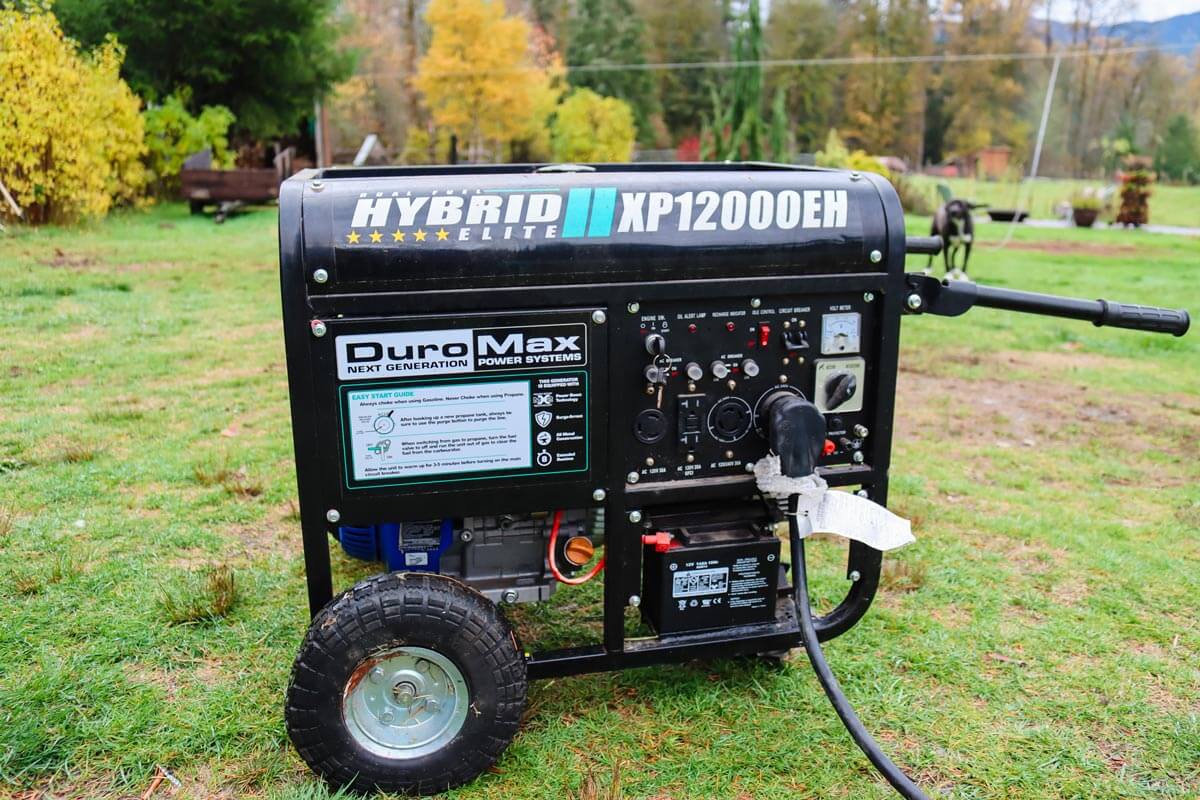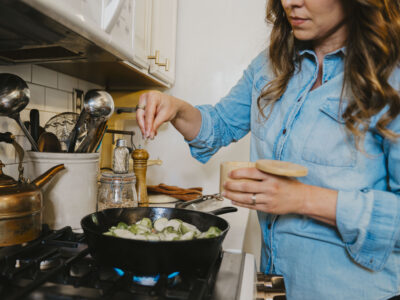We live in a very rural area and experience power outages on a regular basis, especially during the winter months. Over the past 22 years, we’ve learned how to use a generator during a power outage, plus some great things to consider when using a generator or considering the best way for you on how to use a generator at home.
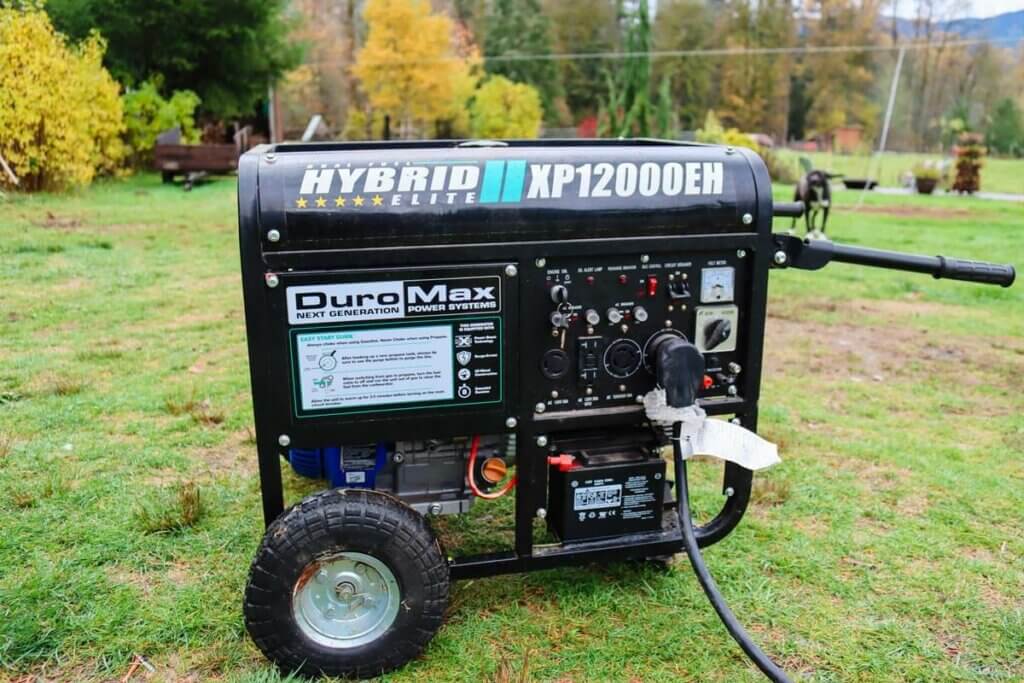
Because we live so far outside of the city, whenever our area has a power outage, especially one that’s widespread, our neighborhood will be one of the very last to get our power turned back on, sometimes days after other people have had their power turned back on.
Owning a generator is an important part of emergency preparedness for us. We’ve gone through many different kinds of generators and setups, and in this post, we’re covering what’s working best for us now.
Tips for Using a Generator
- Never use a generator indoors. Not only are they incredibly loud, it’s just not healthy! You need proper ventillation.
- If power is out due to a storm, wait until the storm is over (or until it’s safe) to get your generator setup.
- Whenever possible, use a transfer switch.
- Quality extension cords matter, especially when running power through multiple cords to reach all areas of your home that are needed.
- If your generator runs out of fuel, let it cool down before refueling.
- Practice when it’s not an emergency! Doing a test run with your generator setup when you’re not worried about the power being out will help you recognize any oversights.
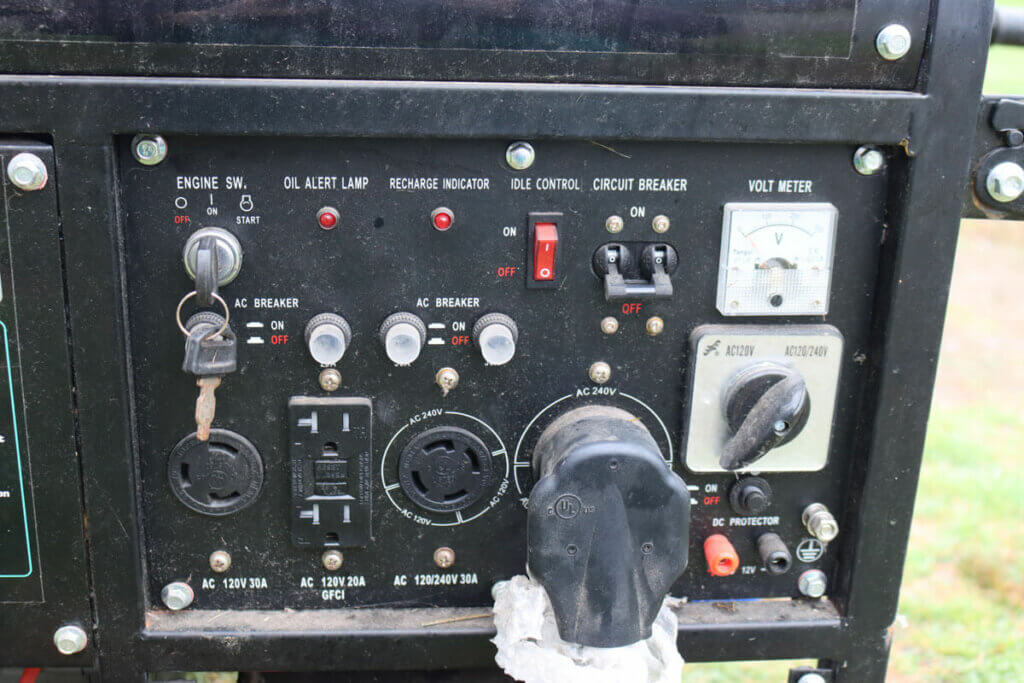
The Best Generator Setup For You
What Do You Need Electricity For?
In order to know what kind of generator, or even what kind of setup you’re going to need with your generator, you first need to know what you’re going to need electricity for if/when the power goes out.
For us, we definitely need power for our deep freezers. Now, don’t get me wrong, I am a true Pioneer girl and I know how to preserve food at home, but I’m also a modern homesteader, which means I actually like the conveniences of the 21st century.
Because of this, we still keep a good large supply of meat in our freezers since we raise a year’s worth of meat here on our property.
I do a good deal of freeze-drying (check out my freeze-dried eggs), dehydrating, and canning, and I do enjoy canned ground beef, canned chicken, canned stew, etc.
But call me crazy, I don’t want to can my t-bone, ribeye, and New York cut steaks, nor my bacon (which isn’t safe to can by itself anyway), etc. Therefore we still need that freezer!
Frequency of Power Outages
The next thing you need to know is how often your power typically goes out on a regular basis.
Where we live, we can expect a power outage about once a month during the winter, simply due to weather/storms. And sometimes our power goes out without any obvious reason!
These outages are generally pretty short, no longer than a day or two, but we have had one power outage due to a mudslide that lasted two weeks.
Knowing how frequently you’ll be needing a generator will be helpful to know what kind of setup you should have, and whether you need it “at the ready”, or if you can get it set up on an “as needed” basis.
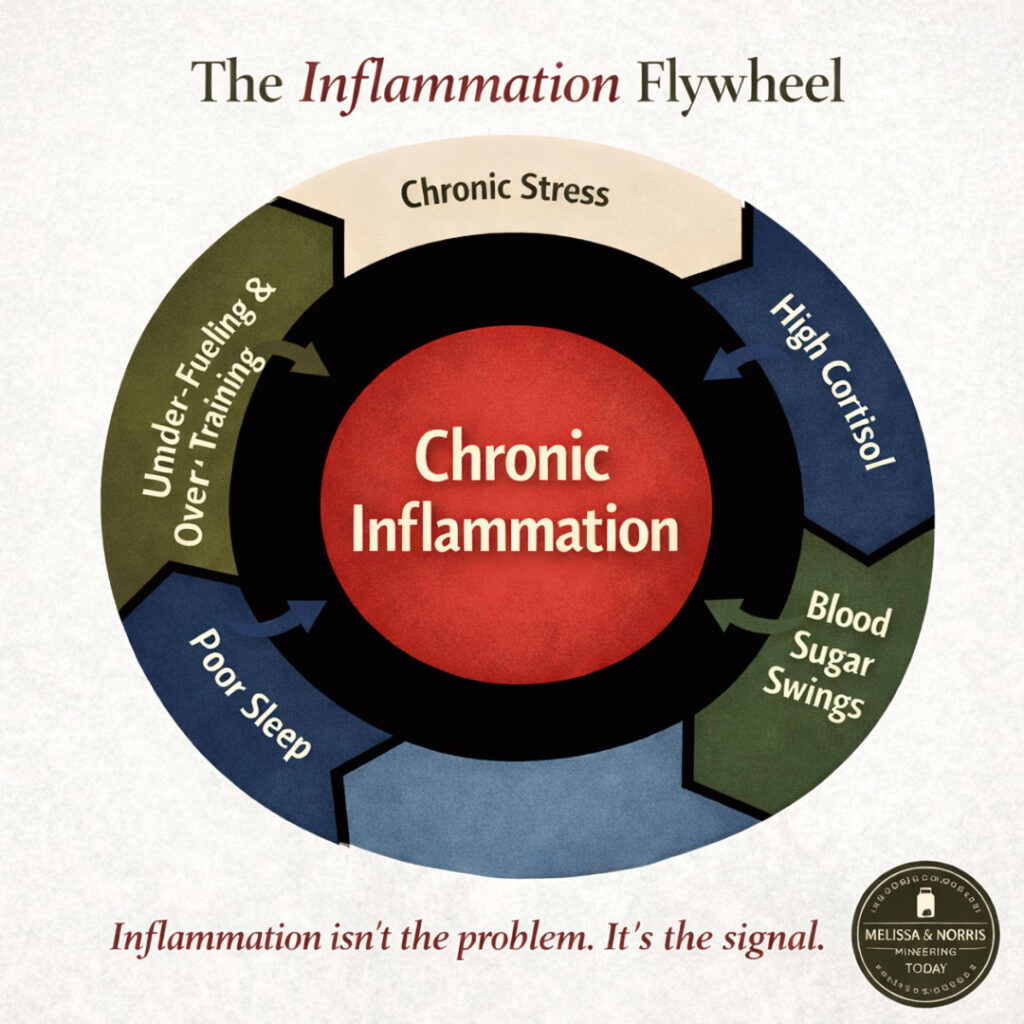
The Hidden Cycle Keeping You Inflamed
If you’ve been feeling puffy, tired, achy, or wired-but-tired, this two-page guide will help you understand what may be happening behind the scenes — even if you’re eating “healthy.”
Download the Inflammation Flywheel Guide and learn:
- Where to start so you don’t feel overwhelmed
- The 5 most common drivers that keep inflammation switched on
- Why blood sugar swings, stress, and poor sleep feed each other
Power Needs
What are your must-have items that will need power during a power outage?
For us, because I work from home, I’m in need of my computer and I rely on having access to the internet for my business.
Beyond that, we also have a private well for our water, and our well is probably the one thing that requires the most amount of electricity at once. (That’s why my family has been looking into a hand-water well pump as a backup water solution in addition to our generator.)
Having a generator large enough to power all your needs is crucial, so knowing the wattage of your appliances and other “must-have” electrical items is key to knowing what generator is right for you.
If you have livestock, you also need to consider their needs. Do you need lights for smaller animals to keep them warm? Do you need power so you can get water for your animals?
Thankfully where we live, in the winter months, we have a natural spring that fills up and provides enough water for our livestock.
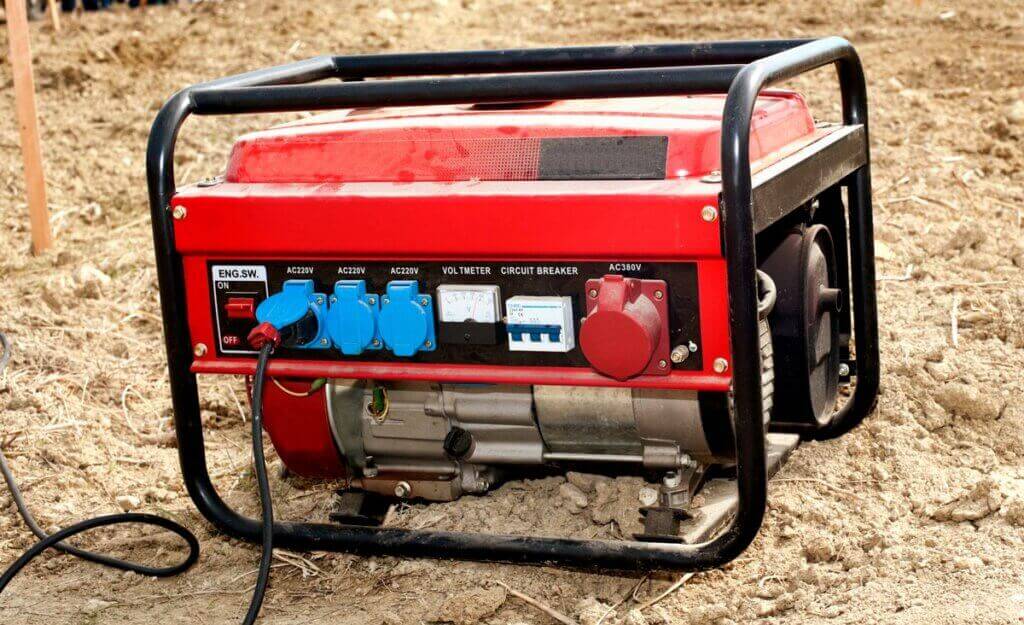
What Size Generator Do I Need?
How do you determine what size generator you’re going to need to run your home? You first need to know how many watts it takes to run your “must-have” electrical items.
Armed with this information, look at the watts on the generators you’re looking at.
Do not look at the maximum watts – this is actually telling you that you can pull up to a maximum amount of wattage from the generator.
Look at the average running watts – this is the amount of wattage that the generator actually can power at any given time.
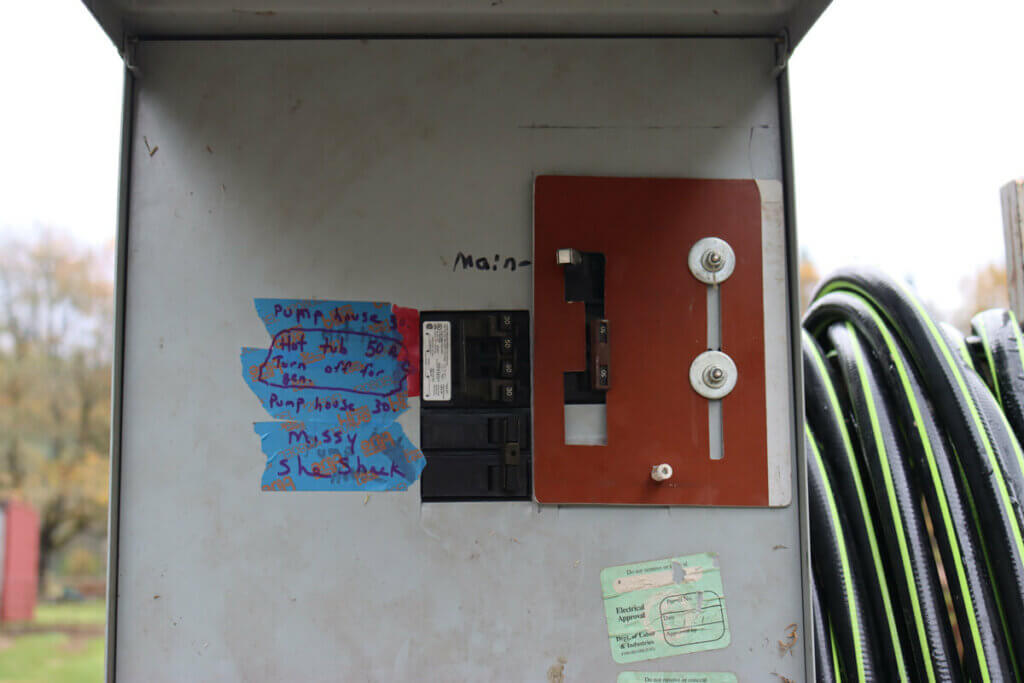
Setting Up a Generator
If at all possible, I’d recommend you have your generator set up on a transfer switch.
We actually had an electrician come out to our house and set up our breaker box so we had the capability of flipping a switch that would then power our entire home from the generator at the breaker box (no extension cords other than the one from the generator to the box)
Make sure all breakers are labeled so you can easily turn off breakers that will draw too much power.
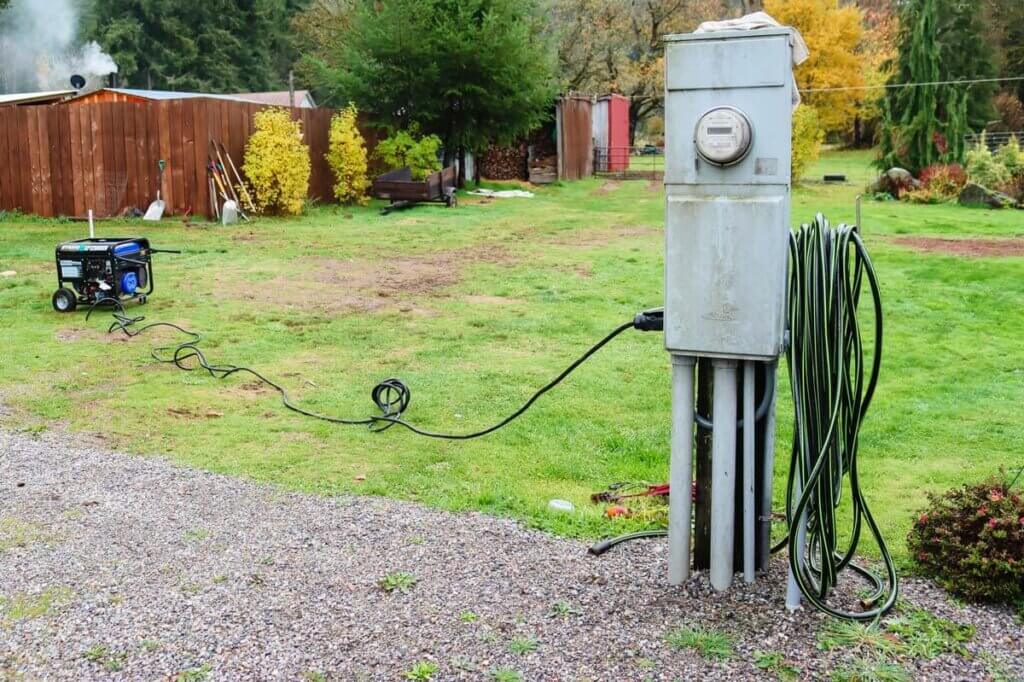
Table of Contents[Hide][Show]
How to Use a Generator at Home
There is a bit of a difference between what we used to do when the power went out and what we do now. So for those of you just getting started, I want to be sure to share what used to work for us for many years.
We had a smaller generator at the time, and we would set it up outside our back porch. From the generator, we would run a long extension cord into the house via a back window and plug in a power strip to that cord.
On a normal basis, it’s not ideal to have multiple extension cords plugged from one to another, but during an outage, you make exceptions. This is also why it’s important to invest a little extra and buy quality extension cords… don’t skimp here!
We would then plug an extension cord into our deep freezer that’s near our kitchen, and another extension cord into our refrigerator, and we’d alternate plugging those into the power strip (because our generator wasn’t powerful enough to power both at the same time).
We would also have a few plugs left open on the power strip for things like the coffee pot, toaster, TV, etc. to get us through the outage.
Our old generator wasn’t strong enough to power our electric cookstove, my computer, our well, or our hot water tank, so we would predominantly cook on the wood stove during a power outage.
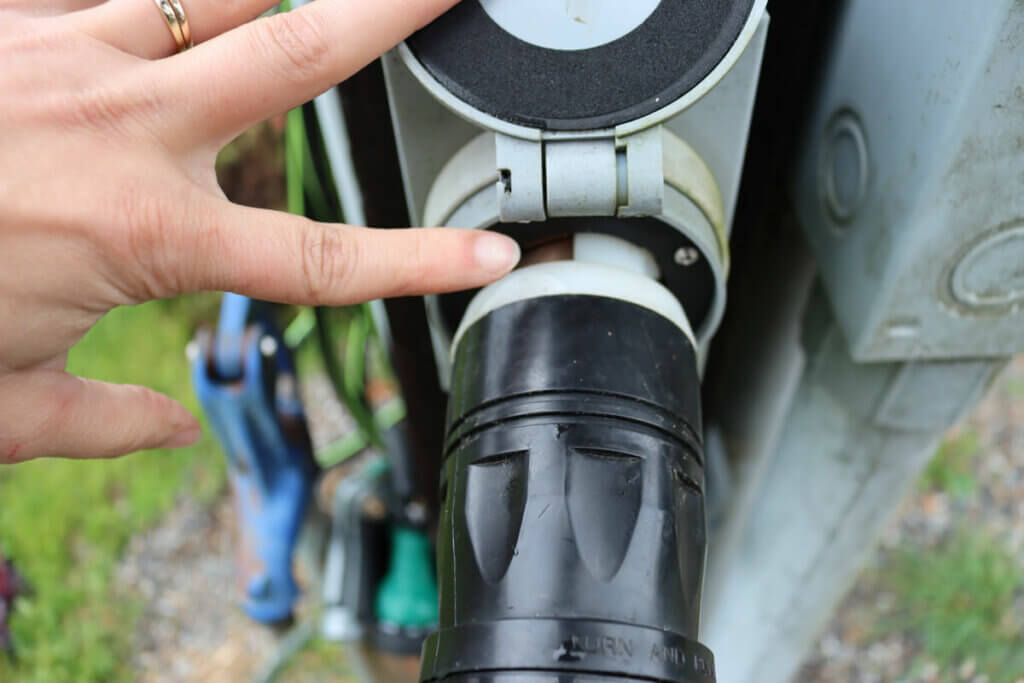
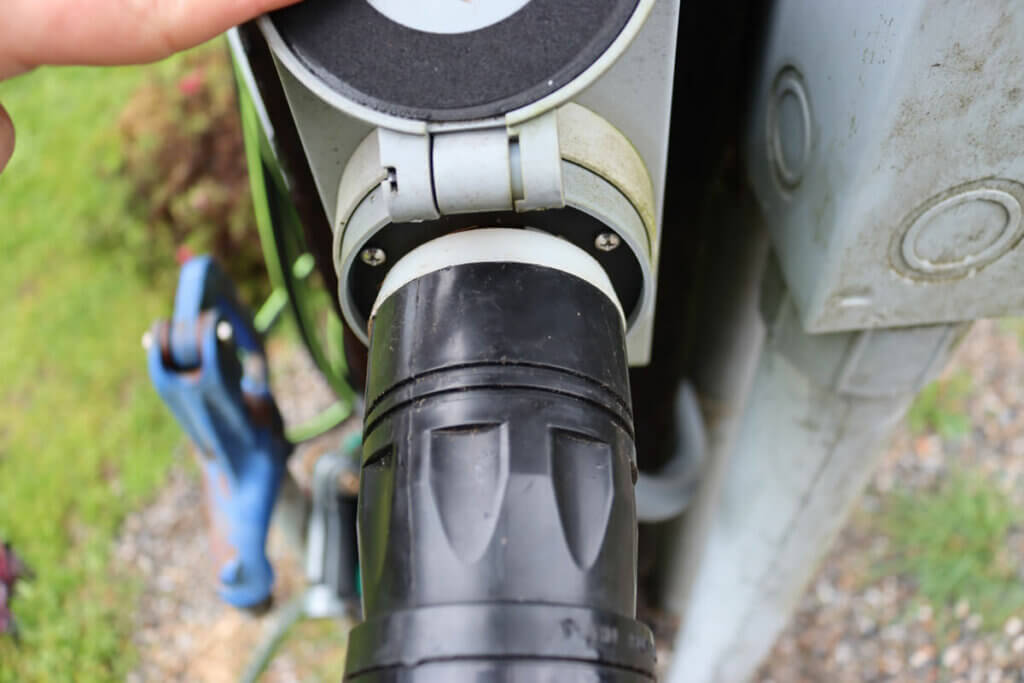
Label all breakers, both in the house and outside at your box if you have more than one building or power source running from it.
Make sure all breakers are turned off both at your electric box and the generator when you first power it up. Let it run for a few minutes to warm up.
Then, plug in your main generator plug to the plug at the box (if you have it wired in). Make sure you line it up and turn it to lock it into place.
Then, turn on the breaker to the LARGEST pulling appliance first. This is the breaker to our pump house and well. That allows it to draw and kick on first without bogging down the motor.
Once that has had a chance to fire up, then we turn on the other breakers for the rest of the house (with the exception of the hot tub and hot water tank).
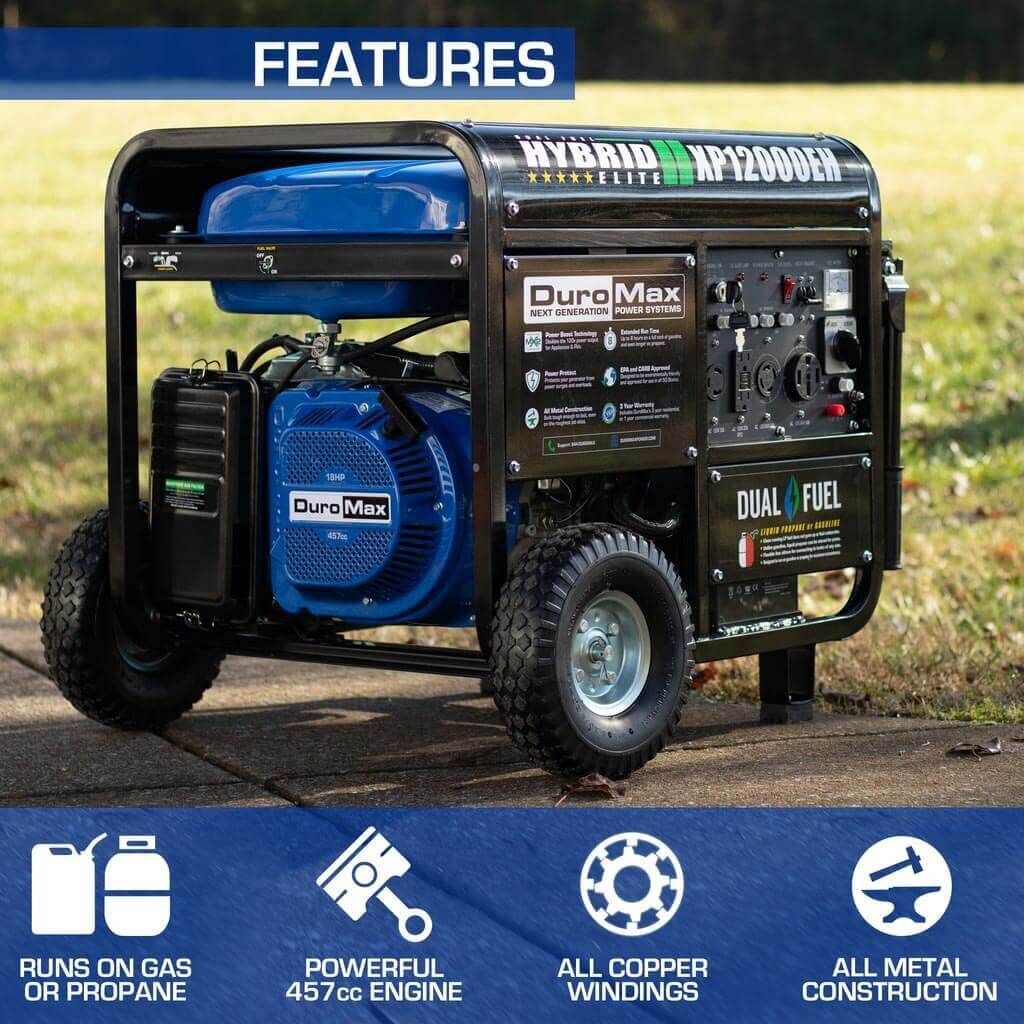
What Generator Do I Have?
After going through that two-week power outage when there was a mudslide in our area, we upgraded to a DuroMax XP 1200 EH. This is a propane or gas-powered generator that’s also RV-ready. (I have no affiliation with them, I just love it and it gets the job done well! Not only that I can move it and get it all set up by myself!)
At the time of this posting (fall of 2021), the cost of this generator is $1,399. For us, it’s worth every penny because the amount of food it helps keep frozen would far exceed the cost of a generator.
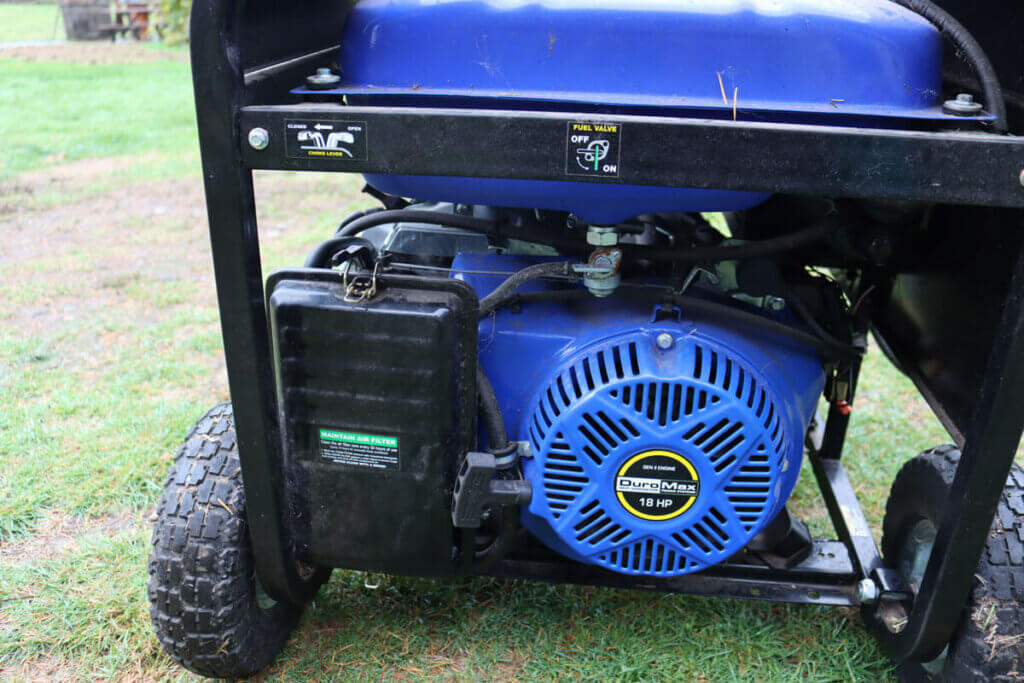
This generator is quite loud, but that’s to be expected as it’s a 12,000 max pull, but the actual running watts are 9,500 which is enough wattage to run our well, all our freezers (two deep chest freezers, one upright freezer, and our refrigerator), plus any other lights/electricity needed during the day for our busy household.
For some reason, however, it does not power our electric cook stove burners very well, even if I’ve turned off almost everything else in the house. I’m not sure if it’s just our stove, or if this is a regular generator issue.
I can, however, use the oven to heat foods like lasagna. Because of this, we tend to still use our wood cookstove for much of our cooking during a power outage.
It would probably also run our hot water tank if we needed it in a long-term power outage situation, but we turn it off because we don’t want to take the risk of the hot water heater and other appliances switching on all at once and potentially ruining or bogging down our generator.
We also don’t power our hot tub, which obviously isn’t a necessity, but it sure is a nice perk!
The reason we upgraded is, as mentioned before, I work from home and need to have enough power to conduct regular business, regardless of our power situation.
If power outages weren’t such a commonality, we could definitely get away with something smaller. This is why it’s so good to know what’s “normal” for your area. So if you’ve just moved somewhere new, it’s a good idea to ask the neighbors what’s normal in that area.
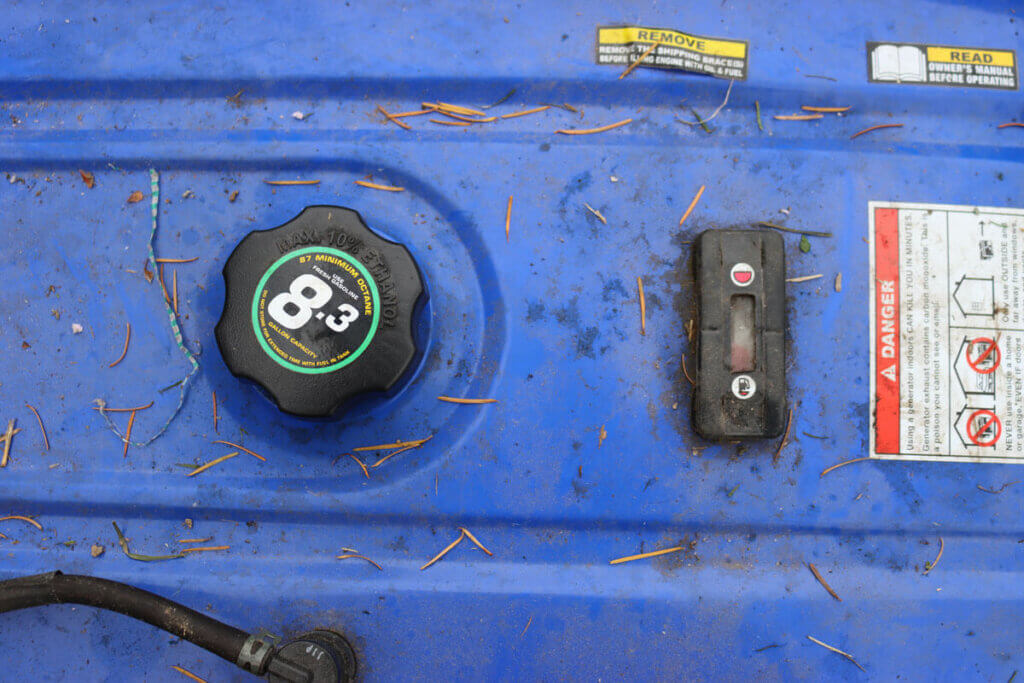
How Much Gas Does a Generator Use?
We don’t use propane for our generator (even though it has propane capabilities), but as far as gas goes, we generally go through 8 gallons of gas in 8 hours time when it’s at 50% load, if it’s pulling the max running watts you’ll go through the gas faster.
Tips During a Power Outage
Keeping Food Fresh
There are a few things you can do to help keep your food fresh for a long period of time, even without a generator.
For deep freezers, you want to make sure you keep the doors/lids closed. Do not go open them and get food out for dinner, just keep those doors shut to maintain as much cold as possible. Food in a freezer should stay frozen for at least 24 hours. If your freezers are in a garage or another outdoor building during the winter months, they may stay frozen for even longer.
For the refrigerator, do not open the doors, just don’t do it! If your power is going to be out for multiple days, you may want to consider removing the food and putting it into a cooler with plenty of ice (a great reason to have a large supply of ice on hand during times of possible power outages).
In northern climates during the winter months, it may be possible to just transfer your food to a cooler and keep it on the patio, especially if temperatures are close to 32-40 degrees F.
Depending on the type of food in your refrigerator, you should be fine even if the power is out for 24 hours. Beyond that, you have to use your own judgment on whether to keep the food or not.
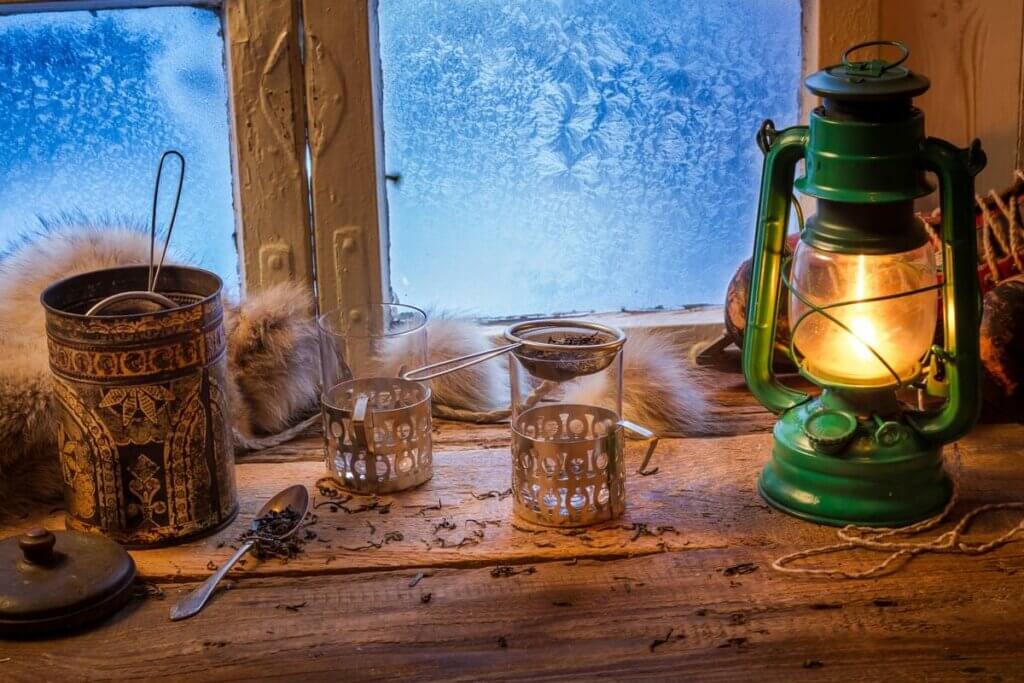
Backup Lighting
It’s a great idea to have some backup lighting on hand for times when you really need to see what you’re doing.
Even though we have homemade candles, it’s very difficult to cook dinner by candlelight, and in the winter months, it’s already dark by dinnertime, so having some kerosene or oil lamps, bright battery-powered flashlights or headlamps, or any other light sources is a good idea.
You can also place a light next to a mirror and it will double the brightness.
Verse of the Week: 1 Timothy 1:12
More Posts You May Enjoy
[fusebox_transcript]
